

Great summertime leisure activities



A warm breeze on a summer day embodies the spirit of this beloved season for millions of people. Seen by many as a season to relax and recharge, summer, not coincidentally, goes hand in hand with leisure.
With more time on their hands due to vacations from school and work and less hectic activity schedules, particularly for families that include school-aged children, individuals often find summer affords more time for leisure. With that in mind, people from all walks of life can consider these summertime leisure activities.
PADDLEBOARDING
Paddleboarding is one leisurely way to spend a summer day. Paddleboarding requires physical exertion, so this might
not be the ideal activity for those looking to relax without lifting a finger. However, paddleboarders typically take to the water when it’s at its most calm, making this a great activity for those who want to capitalize on peaceful, serene summer vibes.
FISHING
Few activities may be more relaxing than fishing. Though there are many different ways to fish, some of which require considerable physical effort, casting a line and waiting for a fish to bite is a relaxing way to spend a day in nature. That might not seem like much to novices, but spending time in nature has been found to reduce stress and lower heart rates, which the U.S. Forest Service notes are both risk factors for cardiovascular disease.
RELAX BY THE WATER
Whether it’s a pool, lake or even the ocean, the water beckons each summer. Simply sitting on a beach or beside a lake or pool is a great way to pass the time without much stress. Nothing needs to be scheduled when relaxing poolside, lakeside or on a beach; simply enjoy some time to relax by the water.
READ
Books make for great companions on warm summer afternoons. Reading is such a popular summer pastime that many bookstores set up displays featuring books that make for great beach reads, providing inspiration for individuals who aren’t sure which book or books to dive into this summer. And much like other summertime
leisure activities, reading has been linked to reducing stress.

A 2009 study from researchers at the University of Sussex in England found that reading can reduce stress by as much as 68%.
VISIT A MUSEUM
On summer afternoons when it’s raining or too hot outside or individuals simply want to spend some time indoors, a museum makes for the perfect place to visit. Museums do not typically draw crowds in summer, making this an ideal season to visit. Many offer discounted prices to individuals like seniors and students, so this is a great way to relax without breaking the bank.
(METRO CREATIVE)For many boaters, boating is a family tradition – a way of life that includes shared experiences like the first time you take the steering wheel, catch a fish or trim a sail. Not only are moments like these fun for the whole family, but they also bring parents and kids closer together as the family becomes a “crew” through teamwork and shared responsibilities.
For every family member to join in and participate, however, you’ll naturally want to choose a type of boat that everyone can enjoy to the fullest potential.
Which is ideal for you and your family will depend on several factors: what type of boating does your family enjoy? How large does it need to be, and what accessories should it have? As you ask yourself these questions, remember that for most families, one of these seven boat types is likely ideal. Discover Boating says these are the best starter boats for families:
BOWRIDERS
If joyrides across the lake or bay, towing water toys, swimming at the beach, and
The top 7 BEST BOATS for families
generally kicking back on the water sounds like good times to you and your kids, a bowrider may be your perfect choice.

Bowriders are one of the most popular family boats, thanks to their high versatility, copious seating, and easy access to the water.
Bowriders are available in a vast range of sizes that match just about every budget, from small 16-foot runabouts to 30-plus-footers with every comfort feature imaginable ranging from enclosed head compartments (full bathrooms) to complete outdoor kitchens (though we call them galleys, on a boat). And while they may not be the ideal platform for activities like fishing or overnighting, bowriders can be used just about any waterborne activity you can dream up.
CABIN CRUISERS
Cabin cruisers are larger than many other boats and can cost quite a bit more. Still, they also expand your abilities to include adventures like visiting distant ports, weekending aboard, or even taking
a family vacation on the water. They’re more or less like having a mobile home that floats, and most come with everything you need for adventures that last days at a time.
FISH-AND-SKI BOATS
Fish-and-ski boats are designed to be just what their name infers. They have all the essential accouterments you need to chase those finned critters in the morning, then enjoy water skiing, wakeboarding, and similar watersports in the afternoon.
Most have a layout similar to that of a bowrider, but with the addition of fishy features like livewells, rod holders, and an electric trolling motor, plus tow-sports goodies like a ski-tow pylon and ski lockers.
Although some trade-offs must be made for a boat to be designed for multipurpose use (that livewell could be a drink cooler on a dedicated watersports boat, and that bow seating might be a casting deck on a boat meant purely for fishing). But on the whole, the fish-and-ski is perfect for families that
Editor in Chief: Tracy Ouellette
Creative Director: Heather Ruenz
Advertising Director: Vicki Vanderwerff
Page Designer: Jen DeGroot
above: Choosing the right boat for your family will require some research. Before you buy, consider how your family will use the boat.
want to participate in both activities.
JET BOATS
Though the range of available choices is a bit less expansive when it comes to jet boats, and jet propulsion tends to be slightly less efficient than more traditional choices, they have one perk that many family boaters love: there’s no propeller.
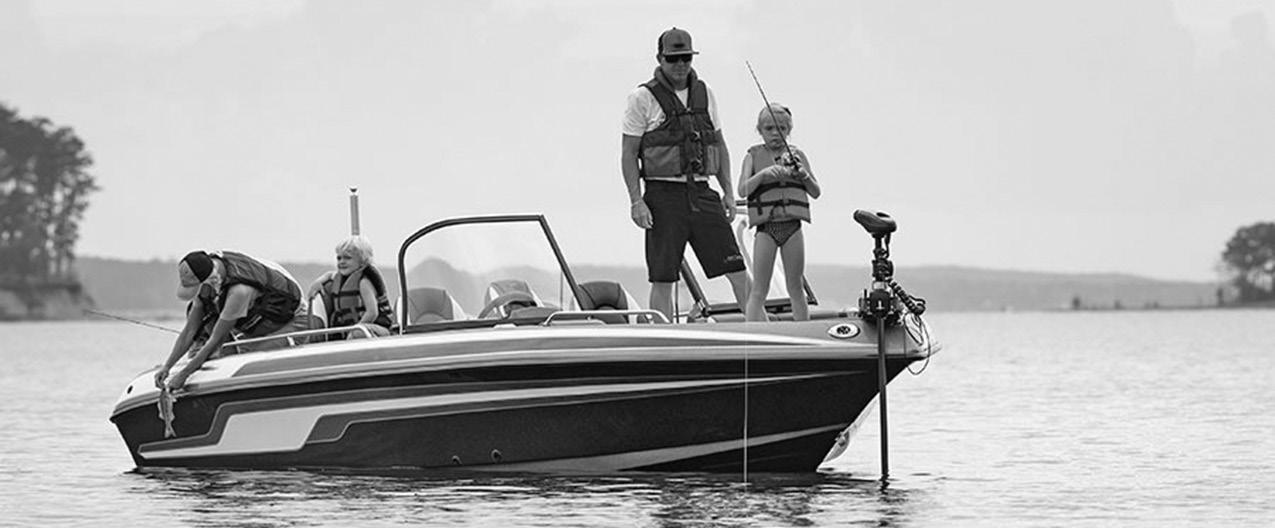
Propeller injuries are exceedingly uncommon in any case, but the mere thought of doing away with the prop and instead propelling the boat with a powerful jet of water gives many parents invaluable peace of mind. Plus, jet boats have excellent handling, minimal draft, and all the other features and accessories found on runabouts.
PONTOON BOATS
Pontoon boats are incredibly popular, and it’s no wonder why: the stable, comfortable platform they provide is ideal for kicking back and lounging on the water. But don’t think for a moment that today’s pontoons can’t be downright thrilling, too.

Many come with potent engines that provide exciting performance and the ability to enjoy watersports. And while they may not be as apt at handling large waves as monohull boats, many of the larger pontoons and “tritoons” (boats with three pontoons instead of just two) are surprisingly capable in choppy waters.
SAILBOATS
Sailing is, of course, a very different experience than powerboating. Speeds are significantly reduced, and operating a sailboat is far more complex than pressing down a throttle and turning a steering wheel. Yet these “drawbacks” are, in some ways, what makes sailing so appealing – it takes skill and teamwork to sail a boat from
your dock to your destination, and every family member has a role to play. Plus, modern sailboats are available in all different sizes and comfort levels. Added bonus: since sailboats don’t require huge, powerful engines, compared to powerboats on a foot-to-foot basis, they generally cost significantly less.
WALKAROUNDS
Walkaround boats can be ideal for families that enjoy fishing and day cruising yet also want overnighting abilities. They usually have large, open aft cockpits where you can swing a rod or set a trolling spread, but the bow is enclosed and provides both sleeping accommodations and weather protection. And while it’s true that many types of fishing center consoles may be the most effective design, many angling families with young children – especially those who may go fishing in chilly or rainy conditions – choose walkarounds mainly because of that added protection.
CONCLUSION
In most cases, one of these seven boats will prove ideal for you and your waterloving family. Of course, there are other, more highly-specialized boats that you may find tempting.
If bass fishing is your true love, bass boats will be impossible to beat. Speed demons will naturally gravitate toward high-performance boats. And if wakesurfing is your sport of choice, then getting a dedicated ski boat/wake boat may be in the future.
But in every case, remember one thing: find a boat that makes you and your loved ones happy, and spending time on the water will draw your family closer together – and that’s one thing we can guarantee. Source: discoverboating.com.

lakeside hike
Traveling the Geneva Lake Shore Path
by Sandra Landen Machaj CORRESPONDENTfter several days in the area enjoying a variety of sights and activities, visitors may feel they have experienced all that the area has to offer. They might have enjoyed a boat trip on Geneva Lake, spent a day at Riviera Beach taking in the sun and water, endulged at one or more of the unique restaurants, shopped until they were ready to drop at boutique and specialty stores, and maybe even taken a bike ride, hot air balloon ride, or gone zip lining.
In spite of participating in all these activities, they may have missed one special feature – the Geneva Lake Shore Path.


The popular walking trail borders the entire Geneva Lake, and the trail itself is roughly 26 miles long.
The history of the path goes back to the days of the Indigenous people of several Native American tribes who made their home in this area, including the Potawatomi led by Chief Big Foot.
A plaque placed Lake Geneva’s Library Park, which is behind the beach and along the shore, gives a short history of this trail that began many centuries ago.
“The 26-mile lakeside trail along the shore of Geneva Lake was used by several Indian cultures from 2500 BC and continuing to 1836 A.D. Chief Big Foot’s Potawatomi tribe walked the trail between their villages at present Fontana, Williams Bay, and one at Lake Geneva located in this park. Later, the trail became the workmen’s path from Lake Geneva to the summer estates of wealthy Chicago families,” the plaque reads.
These wealthy Chicagoans made their way to the shores of Geneva Lake after the Chicago Fire of 1871, the one that was said to be started by Mrs. O’Leary’s cow. At that time the citizens of Chicago looked for an escape for their families, away from the smoke and polluted air of the city as it was rebuilt.
It was to Geneva Lake that they traveled,

where they found the perfect setting to build summer cottages. But unlike the summer cottages most would envision, many were actually mansions, large and elegant, much as their homes in Chicago.
Wives and children would come to the lake for the summer, with the families’ servants, while the husbands would commute on the weekends as they continued to work during the week.
Many of these lavish homes can still be found on the shores of Geneva Lake, and they can be seen from a boat on the lake or while walking the Shore Path. Over the years, some of those lavish homes have been torn down and the properties divided into smaller parcels with new buildings. While some may be less impressive than the originals, they are still a sight from the lake or shoreline.
Public domain
It was the early settlers who deemed that the “20 feet leading to the shoreline be preserved as public domain.”
The plan was to keep this historical path for future use in memory of the past and to assure the lakefront would remain accessible for all to enjoy. Each property owner, then and now, is required to maintain the walking path through their property, which has resulted in many sections of the path being unique. Just as each estate has a different look, each owner has provided their own manner of maintaining – and sometimes being creative with – their portion of the path.
As one can imagine, not all property owners were pleased to have strangers wandering through their property and some would even try to discourage visitors from traveling across their yard by making their section of the trail narrow, overgrown or not appealing in other ways.
In 1970, the then owners of Stone Manor were sued by the City of Lake Geneva for constructing a fence that blocked the shore path. The city won, the fence came down, the path remained intact.

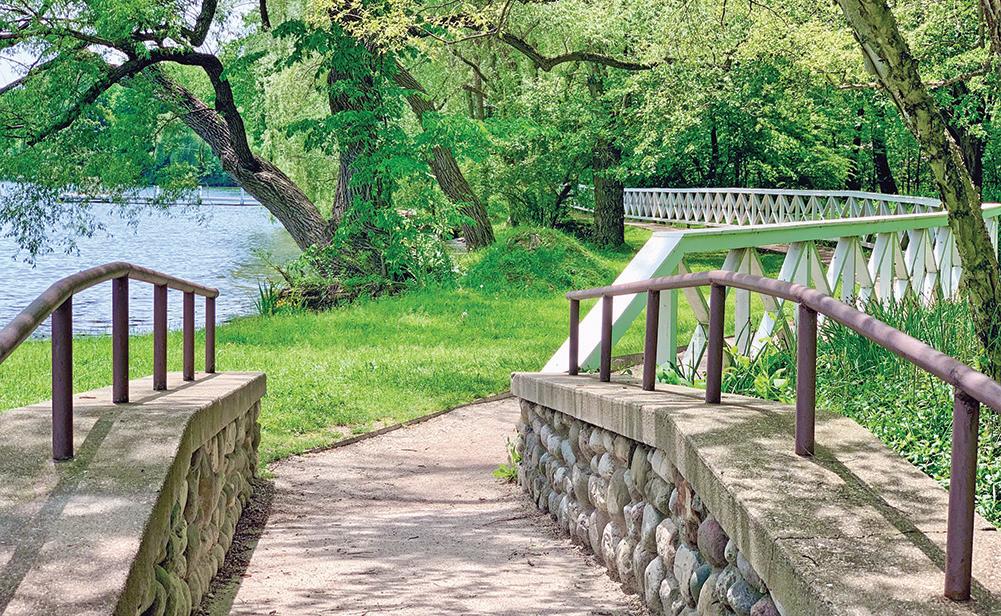
While walking the entire path in one day is possible if one is in good health and walks regularly, it is said to take eight to 10 hours to complete. By dividing the walk into sections, it can be easier to navigate the length. There are public access points where walkers can join or leave the path however, cutting through owner’s lawns from other areas is
not acceptable. Path walkers also are not allowed to sit on the piers, chairs or benches on the property of homeowners as only the actual path is open to the public.
For those who wish to tackle the shore path in shorter stretches, access points to enter and leave the path are available in Lake Geneva, Fontana, Williams Bay, Linn and Big Foot Beach areas. Each one of these sections will provide a comfortable walk without being overwhelming or taking an entire day.
Dan Johnson and his family, of suburban Chicago, were seen doing just that recently,
“We come up several times a year and try to do a section each visit. Someday we hope to be able to walk the entire path in one day,” Dan Johnson said with a smile.
“But I think that will have to wait until these kids are a bit older,” he
Sunday, July 16 | 4 p.m.
Lake Geneva Symphony Orchestra
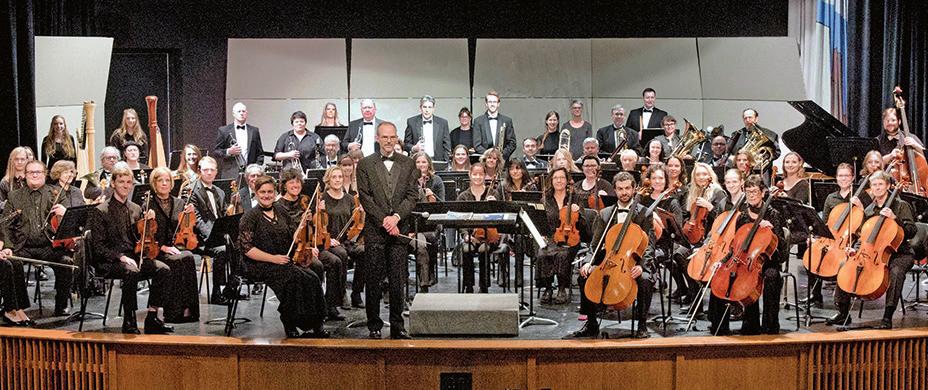
Travel with the Lake Geneva Symphony Orchestra this summer and visit places across the country through music! Experience Chicago from the musical and Sinatra’s New York, New York. Come along for this amazing adventure!
UPCOMING EVENTS
Saturday, July 22 | 7:30 p.m. The
Guess Who
Legendary Canadian band The Guess Who enjoyed chart-topping hits in the late 1960s and early 1970s with an impressive catalogue of songs, including “American Woman,” “These Eyes,” and “No Time.” The band has released 11 studio albums, and charted 14 Top 40 hit singles.

Saturday, July 29 | 7:30 p.m.
BritBeat
Take a trip back in time with a fantastic voyage through the days of Beatlemania with BritBeat’s multimedia concert journey through Beatles music history. See why this nationally acclaimed Beatles show is captivating audiences and generating rave reviews from critics.

added while pointing to his 7- and 9-year-old children.
If a group only wishes to walk a section of the path and has access to two cars, it’s suggested they park one vehicle at each end to avoid having to walk back to the car.
Parking is available at each access point.
The walk from Lake Geneva to Williams Bay is about 7 miles, while a shorter walk from Williams Bay to Fontana covers about 3-1/2 miles.

Tips for comfort, safety
The shore path is a walking path and not made for bikes, scooters, strollers or wagons. With surfaces that include cement, bricks, wood planks, gravel, stepping stones and narrowing in areas, it’s not practical for use by anyone other than walkers. Wearing comfortable walking shoes with non-skid treads is essential for safety especially when the path might be wet and slippery.
Safety is important as some areas of the path are very close to the water and may not have a fence separating walkers from an unexpected swim.
It’s recommended that beginning in Library Park and heading either direction on the path is perhaps the easiest portions of it, especially for those who have young children or anyone with mobility issues.

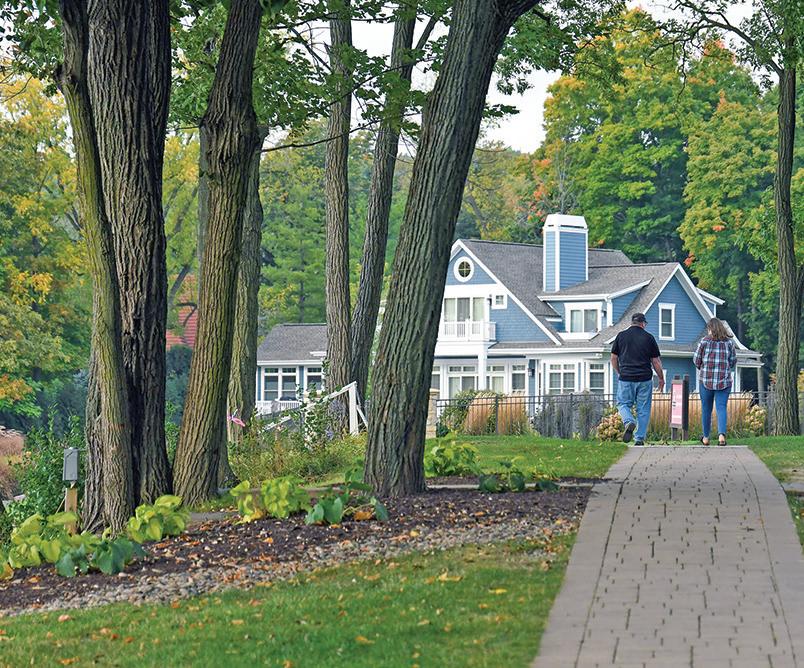
On the other hand, for those who are going to try to walk the entire path in one day, experienced walkers suggest starting at the south end of the lake as that section is known to be more difficult and therefore, best attempted when starting the long walk.
Walking the path is a year-round option but many wonder when it’s best enjoyed.
Spring – when the trees are beginning to bud and flowers and greenery are beginning to show? Maybe summer is the time to enjoy
the shore path, when everything is in full bloom? Then there is autumn, with its myriad of colors as the trees turn shades of red, orange, yellow and brown, and the sites of fall can be found all around the lake.
While those three seasons offer a unique view of the path and lakes, winter also gives a breathtaking view of the lake and shoreline. That may not be the best time to try to walk the path as it’s not shoveled and can be icy and slippery in many areas. Also, in the off season some of the piers may be stored in a manner, blocking the path, possibly making passage challenging it not impossible.


So, when is the best time to walk the path? Any season, really. In fact, a walk during each one of them will offer a very different take of the lake and homes and landscaping in the area.

While preparing for a walk –as mentioned before – sturdy, comfortable walking shoes are important, but that’s not all.
On sunny days, note that a portion of the walk will be in the sun as the entire path is not shaded and there are no public shelters. Remember to wear sunscreen and a hat to protect from sunburn.
There are also no restrooms or food stands on the path. Restrooms are available in areas such as near the public library in Lake Geneva as well as the villages of Williams Bay and Fontana. Carry water or other liquids with to avoid dehydration. Dogs must remain on a leash and under control the entire time while on the path. Walkers must clean up after the dog and remove the waste from the area. There are no public access garbage bins so whatever you bring in must leave with you.

How the Geneva Lake Museum came to be
 By Sandra Landen Machaj CORRESPONDENT
By Sandra Landen Machaj CORRESPONDENT
he roots of the Geneva Lake Museum go back to the 1970s, when a group of Lake Geneva history buffs would gather together informally at a local church and share their knowledge of the history of the area.
Helen Brandt was one of those early historians who cherished the history of the Geneva Lake area. Now, 40 years later, Brandt is still actively involved with the museum, having served as curator of the museum since the beginning and continuing to do so today.
“In those early days, we did not foresee that the museum would eventually become a reality,” said Helen Brandt, “but we are pleased that it did and continues to grow.”
It was not until 1983 that the possibility of a home for this Historical Society became a reality.
“The home at 818 Geneva Street was owned by the city, and we applied to use it as a museum,” Brandt said. “It took a while for the plan to be approved by the State Historical Society and when it was, we celebrated.”
The group began the task of displaying the historical artifacts that they had acquired in a tasteful and attractive manner, using several rooms on the first floor as a museum. Eventually, the staff were able to add the upstairs bedrooms for displays, which they filled with a variety of antique toys. In addition, Charlotte Best Peterson – a local artist – developed some brochures about the new museum to encourage visitors.
“The museum officially opened to the public on May 25, 1984. We were open only on weekends from 1 p.m. to 5 p.m.,” said Brandt. “In those early days, there were no charges to visit the museum, but there was a tip jar at the entrance.”
The tip jar, Brandt said, is the same one that is present at the museum today. The single dollar bills dropped into the jar – or occasionally a $5 bill – helped to pay expenses in the early days.
The city, too, provided a small supplement. Fortunately, the expenses were kept low.
To supplement the income,
the group engaged in the popular fundraisers of the day, holding either a book sale or a bake sale. But they took it a step further by combining the two and holding a Book and Bake Sale on the front lawn of the museum. They were pleased that their sale was so successful and they earned $475 the first year.
It was in the house that they began the “Sundays at 2” program with some of the early speakers including the director of Yerkes Observatory, a diver and a collector of barbed wire.
NEEDING MORE SPACE
Just as houses become overfilled as people live in them, soon the Geneva Lake Area Museum of History was facing the
same problem. More artifacts were collected and needed to be put on display.
“We began to look for the possibility of a new home,” said Brandt. “We first looked at the space that had been the Christmas Memory Shop, which was then owned by the city of Lake Geneva. It was larger than our current space and older with a hole in the roof. We would have also had to update the building to meet ADA accessibility standards.”
While continuing the search, another building became part of the discussion – the Wisconsin Power and Light Building at 255 Mill St.
A short history of the building is posted on the front of it and reads, in part:
“The Lake Geneva Water and Light Company built the original building in 1894 and expanded it in 1929. In 1897, the Haskins Electric Company first generated electricity here and in 1898, the Equitable Light Company was formed, which worked with the Lake Geneva Water Power and Lake Level Co. to provide electricity. In 1915, Equitable became Southern Wisconsin Power and Light Company. In 1998, the City acquired the building and the Museum relocated here in 2004.”
The building, which is as historical as the objects that the museum would be displaying inside, was the perfect place to consider as its next home. Fortunately, the City was willing
to lease it to the Museum for $1 a year and they would also maintain the exterior.
April 10, 2004, was a day of mixed emotions, as members of the museum said farewell to the place that had been the museum’s home. They also realized it was a time of excitement as the museum moved on to bigger quarters. It would be several months before the museum was ready to be opened to the public as volunteers dealt with the need to build the displays.
Those involved also sought ideas and direction on how to turn the building into a home for the museum – a home that would best tell the story of the history of the
MARINE TRADING POST

BUYING, SELLING & SERVICING BOATS AND MARINE EQUIPMENT


CLASSIFIEDS
BOATS
1957 DUNPHY CLASSIC BOAT 15’ molded Mahogany. $9,500. Call 262-948-3727.
1973 25’ CHRISCRAFT CABIN CRUISER
V8, old tandem trailer. $800 OBO 847-4973692
2000 SUPRA LEGACY, Indmar inboard, very low hours, always garaged or lift kept, Elkhorn. $11,500. (262) 949-6997.
1977 SYLVAN 16’ CONSOLE STEERING w/cover, replaced flooring, transum, carpet, swivel seats. 1985-50HP Mercury SS prop. Minn Kota trolling motor. Lowrance locator, down riggers,trailer and xtra’s. $3,500 OBO. 262-758-7663.
2001 TIGE 211 WAKEBOARD BOAT 21’ Wakeboard /Ski Boat w/Perfect Pass. Includes trailer. 600 hours. $15,000. Call 224-535-1657. CANOE CEDAR STRIP WOOD & original canvas from the 50’s. Great shape. Use or hang in your man cave. $1,500. 414-331-3771
Be

in the next edition of the
Geneva Lakes Breeze
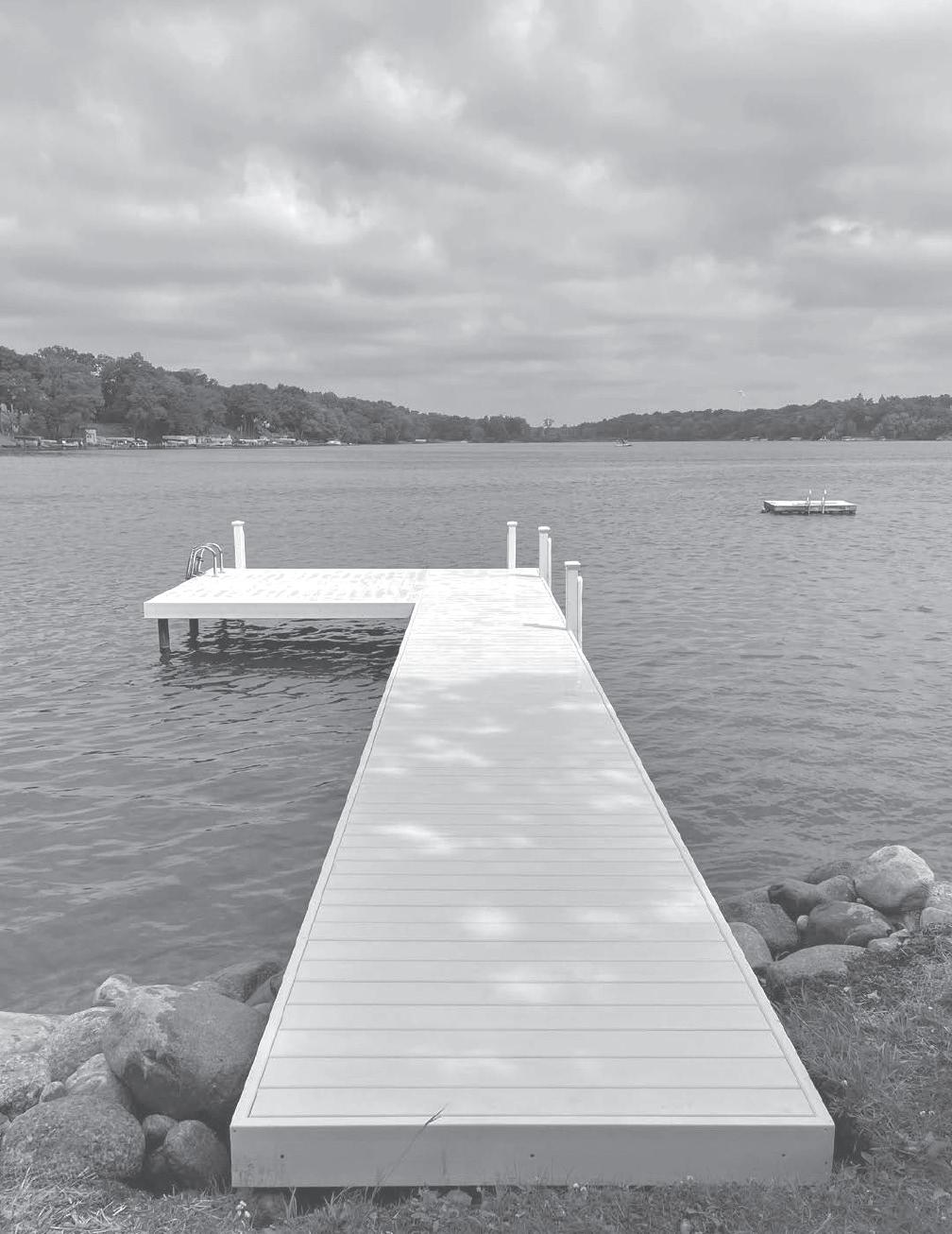
NEXT PUBLICATION DATES: August 17,


For any other advertising needs, please contact Jackie Stearns at (262) 352-0156
LAKES AREA CLASSIFIEDS
BOATS FOR SALE
Ski Boats/Fishing Boats
1990 Mastercraft Prostar 190, low hours, excellent ski boat, trailer, lift kept $7500 best (262) 949-6997
1995 Mastercraft Sammy Duvall series, Corvette engine, flat wakes great slalom boat $13,500 best. (262) 742-3665
2000 Supra Legacy, very clean, garage/lift kept, bow rider, 275 hours, $11,500 best. (630) 886-6667
Fishing Boats
14 foot aluminum fishing boat, trolling motor, oars, battery. $395. (262) 742-3665.
Lift and Lift Parts
Jet ski lift, Needs some repair $25.00. (262) 949-6997
Shore station lift parts, cheap. Lauderdale Lakes. (262) 742-3665
Ski Equipment
Ski trainer, easy to get up on, builds confidence. $75. Text (262) 949-6997
Slalom ski, 67”, great shape, $125.00. (630) 886-6667
Skis, doubles, nice condition. $75.00. Text (262) 949-6997
MUSEUM
community.
• CONTINUED FROM PAGE 9
“We sent two or three members to the Milwaukee Museum for ideas and they were impressed with their display of the streets of Old Milwaukee,” Brandt said.
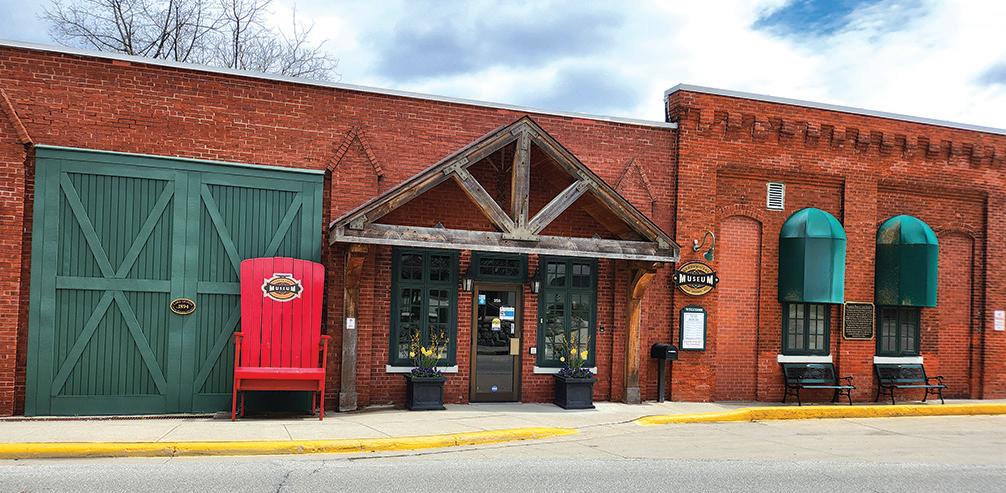
That was the thought behind the beautiful Main Street built into the Geneva Lake Museum. Visitors are impressed when they enter the museum and see the brick street through the middle and follow the development of Lake Geneva beginning with the first display honoring the Indigenous peoples who made their homes here.
ON DISPLAY
As visitors move down Main Street, the face of the buildings looks just as Main Street in Lake Geneva looked in the past. That is with good reason, as the building fronts were actual buildings on Main Street. When they were replaced, the originals were brought to the museum and Lakeland Builders of Walworth County repurposed them as the face of Main Street. Inside each building front is the re-creation
of a room displaying the antique items that have been collected over the years. While many museums keep their displays behind ropes, at Geneva Lake Museum, visitors are free to walk through the rooms.
One of the more unique rooms is the kitchen, which contains two kitchens from different centuries in one space. On one side is an 1880’s kitchen with its woodburning stove, while the other side of the wall is a 1920’s stove and a 1927 General Electric refrigerator with a condenser on the top.
One side of the street in the museum is devoted to private homes, the other gives homage to farms, industries and businesses of the past. The most recent addition is Vern’s Barber Shop, in memory of a past docent named Vern who for years suggested that a barber shop be added.
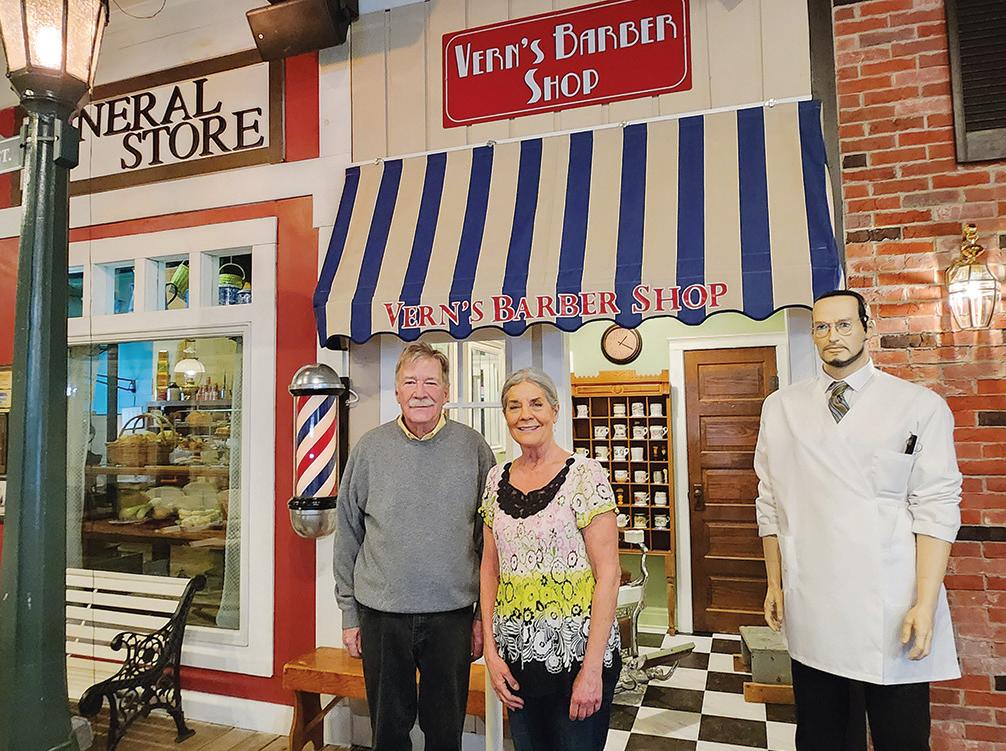
With each visit to the museum, there will likely be displays that have been missed on previous visits or that are new. There never seems to be a time when the board is not developing a new exhibit.

In the past few years, they
have opened the Map Room –with its display of maps of the lake over many years, and; a Northwestern Military Academy display – honoring that institution which stood on the shores of Geneva Lake from 1915 to 1995. This display had special meaning for Janet Ewing, Director of Administration, as her father was a graduate of the school.
While “Sundays at 2” presentations did not continue
at the museum, “Tuesdays at 2” stepped in. Today, the events are held on the first Tuesday of the month with a variety of presenters and historical topics.
Brandt presented the 40-year history of the museum at the “Tuesday at 2” program in May. After her presentation, City of Lake Geneva Mayor Charlene Klein presented a certificate of recognition to Brandt for her work and a certificate to the museum for
40 years preserving history.
“The museum for 40 years has been a gem for the city. Helen, too, is our gem,” Ed Schwinn, president of the museum, said. Museum staff are in the process of working on a display to honor Gary Gygax, and the game Dungeons and Dragons, which he created in Lake Geneva. This impressive room with an original
game table and beautifully stained glass windows is a work of art that they hope to complete this year.
HOW TO HELP

The museum is raising funds to install a lift to make entrance to both levels accessible to all. The five-step stairway between the Main Street and North Gallery requires those who cannot climb the stairs to go outside and reenter. On rainy or very cold days, it’s not a comfortable way to view the entire museum. With the addition of this lift, it will make the entire museum accessible for all visitors.
The funding goal is $50,000 and donations are currently being accepted. To contribute, send a donation by check or credit card to Geneva Lake Museum, 255 Mill Street, Lake Geneva, WI, 53147.
The Geneva Lake Museum features interesting and educational history of the area. As it celebrates its 40th anniversary,

it is time to visit if you have not done so. Entry to the museum is $12 for adults; children 12 and younger are free with a parent; seniors 60 and older pay $10; students ages 13 to 17 are $5. Active military in uniform or with ID are free. Memberships to the museum are also available.
“I am very proud to serve as president of this organization,” Schwinn, who has served as president for the past five years, said. “When I see the number of people – from individual families to school classes – visiting the museum and realize the number of people we are educating, it makes all the work of the employees and volunteers worthwhile.”
A free parking lot is located behind the museum on Mill Street. Summer hours are Monday through Saturday from 10 a.m. to 4 p.m. and Sunday from 11 a.m. to 3 p.m. The gift shop on site has photos of Geneva Lake, maps, sweatshirts, jewelry, magnets and more.

